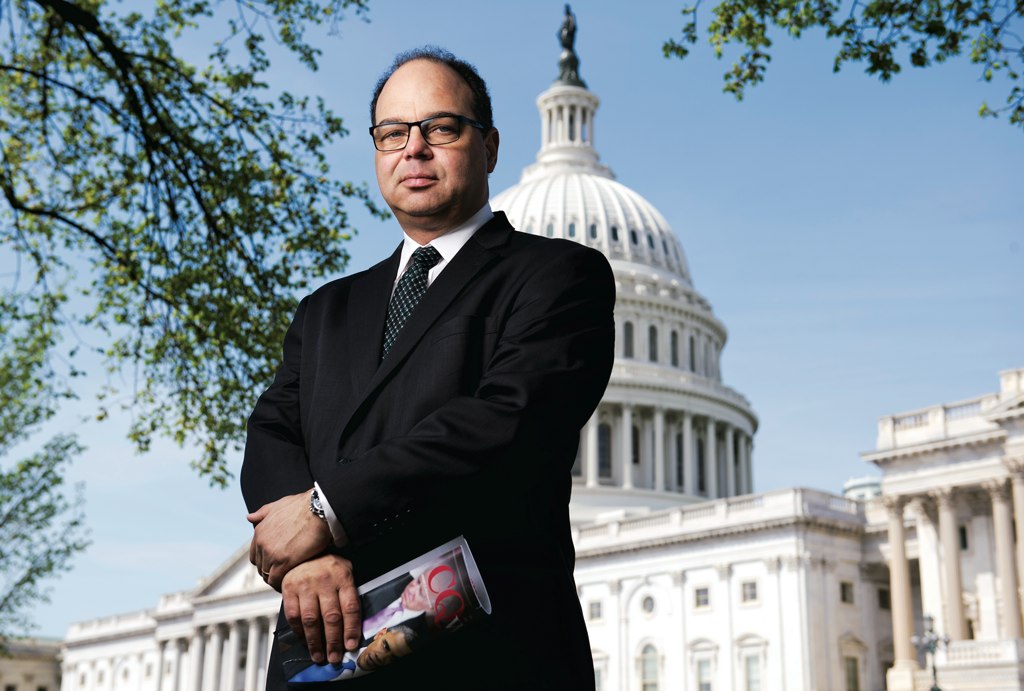It had been a few days since Roll Call reporters had last seen their editor-in-chief, Melinda Henneberger.
That wasn’t too unusual. Henneberger was often absent from the newsroom, working erratic hours the days she was there at all. Few blinked when she didn’t show up to a staff meeting on Monday, August 1.
So when the paper announced her departure the next day, staffers registered a mix of shock and kismet. “People may not have seen it coming the moment it happened,” says one source familiar with the mood of the newsroom, “but weren’t surprised a change was made.”
The news broke quietly, with conversations largely between staff and management. Some first found out from a breaking news item on Politico.
Henneberger’s abrupt departure capped off a nine-month stretch during which web traffic plunged, staff was cut, and brand-name reporters jumped ship in ceremonious fashion. The very mission of the publication—founded in 1955 as the “community newspaper of Capitol Hill”—was called into question, which, depending on who you ask, was the most damning indictment of all.
Roll Call now finds itself confronting a quandary familiar to many old-school DC news organizations: How to adapt and thrive in a radically different media landscape. According to multiple current and former staffers, most of whom spoke on the condition of anonymity, Henneberger’s hire last November was seen as an opportunity to cement a vision for the paper. Instead, these sources say, a new push for national news and heightened personal tension in the newsroom proved a harmful combination: Roll Call had strayed from what many saw as its bread-and-butter—Capitol Hill news—and its staffers, increasingly frustrated with management, lacked the morale to try and steer it back.
***

The story of Roll Call’s existential torment begins well before Henneberger ever set foot in the newsroom. There was something poetic about some staffers discovering her departure through Politico. For nearly a decade, once-dominant Beltway trade pubs had spent the day trying to grapple with Politico and the new media environment it represents: The Hill, once Roll Call’s daily rival, found its footing with fast, often aggregated news—a magnet for web traffic. National Journal, long a publication you needed an expensive membership to read, launched a free website in 2010 that it abandoned last fall. Roll Call’s parent company, Britain’s Economist Group, bought Congressional Quarterly in 2009 and merged the two newsrooms in 2011.
For years Roll Call was a primary source of Hill news, from granular bits on personality clashes during conference meetings to top-line scoops on Senate races. Tom DeLay’s lavish soft-money ploys? Roll Call laid them bare. Trent Lott’s firing of Bob Dove? Roll Call broke that, too. They’re the kind of stories that may have repelled any general-interest reader, but served as vital for those under the dome. And it’s that audience—congressmen, their staffers, K Street folks—that has long kept Roll Call and publications like it afloat. In 2016, though, that may not be enough—and not just because of a robust new competitor. With congressional gridlock, there’s less action to advocate for, which has put a squeeze on ad revenue.
Washingtonian spoke with more than a dozen current and former staffers for this story. All those interviewed agreed that July 2015 was a tipping point. That’s when Christina Bellantoni, then Roll Call’s editor-in-chief, left after about a year-and-a-half on the job to join the Los Angeles Times.
It was then, sources say, that David Ellis, CQ Roll Call’s chief content officer, emerged as a source of internal conflict. Ellis joined the company as Vice President of News in early 2014, following a long tenure at Bloomberg News. In November 2014, he was promoted to chief content officer, a position he still holds today.
From his promotion until Bellantoni’s departure, Ellis mostly left Roll Call alone, focusing his energy on the CQ side of the newsroom. The benign neglect made sense: Web traffic was healthy, and Roll Call was producing the kind of journalism that won the 2015 Dirksen Award for Capitol Hill reporting.

Even so, some felt that Ellis was itching for a more hands-on role. “Everyone got the sense that, as soon as Christina left, Ellis felt he could start micromanaging in the way he had always wanted to,” says one former political editor.
Following Bellantoni’s departure, Ellis initiated a slew of highly publicized layoffs. He fired reporters who had long been staples of Capitol Hill, including Steve Dennis, who is now at Bloomberg, and Matt Fuller, now at the Huffington Post. That same week, he fired congressional leadership editor David Eldridge, a decision that many found strange in the midst of a contentious and newsy race for speaker of the House. Sources say the moves had as much to do with personality clashes as they did with an aggressive push to cut costs: With high profit margin demands, current and former staffers say it was hard to ever feel secure.
Says one former reporter: “I don’t think I’ve ever worked somewhere where people so systematically disliked the person in charge.”
The social-media policy Ellis instituted for reporters in September 2015 helped nurture that frustration. It mandated that reporters tweet any breaking news items to the @CQnow or @rollcall Twitter feeds, so that tweets would link to the corporate accounts and bolster their followings. “It’s your job to support the brand that employs you, over and above the development of your own personal brand,” reads Ellis’s social-media memo, obtained by Washingtonian.
Ellis began scrutinizing reporters’ Twitter activity, according to current and former staffers affected by the policy. They say he created a spreadsheet to track reporters’ weekly ratio of tweets to articles, and that he would approach reporters individually to chastise them if he found their ratio too lopsided. “It was surreal. Tweets to articles published? How do you even compare the two?” says one former staffer. “To me, it signaled a complete misunderstanding of the political-media ecosystem.”
Ellis tells Washingtonian the policy was a matter of common sense. “There’s no reporter here in the last two years who has a bigger following than Roll Call. So, if you have 200 followers, and you’re tweeting about breaking news on Congress, you’re much better off doing it within the corporate Twitter feed.” Asked about the spreadsheet specifically, and whether he used it to evaluate reporters, Ellis would only restate the thinking behind the policy. “I asked all staffers if they were tweeting about Congress, to offer it to the Roll Call Twitter feed.”
Many news organizations feel they benefit by giving their reporters room to build large followings on Twitter. But staffers claim that Ellis was not interested in a discussion of why his policy might be counterproductive. “The unspoken rule became: Never disagree,” says one former columnist. “If he said the sky was purple, then I would say, yes, the sky is purple.”
They say the newsroom’s fraught atmosphere was all the more jarring given the picture just one month before. “It wasn’t all sunshine and roses, of course,” Bellantoni tells Washingtonian. “But we did a lot of work I was proud of. Morale was good.” She says that she and Ellis “had a lot of fights” but that she found their overall relationship to be “productive.”
Of the staffers who were happy to talk smack about Ellis, only a few could offer specific anecdotes illustrating the “cruel” and “heavy-handed” tactics they ascribed to him. One person said Ellis’s demeanor “leaves much to be desired,” but wondered if the animus toward him was rooted less in “specific business decisions” than in “personality” alone.
Nevertheless, Stu Rothenberg, Roll Call’s longtime political columnist, who ultimately landed at the Washington Post in May, says one thing was indisputable. “When David Ellis came in to lop off heads,” he says, “the whole atmosphere in the newsroom changed.”
***
While people in the newsroom groused about tweets and tried to avoid being laid off, Ellis was searching for Bellantoni’s replacement. He cast a wide net, seeking advice from Roll Call alumni such as the Washington Post’s Chris Cillizza and Paul Kane and USA Today’s Paul Singer. Ellis wanted to know what they should look for in a new editor, along with what the paper should strive to accomplish moving forward.
He didn’t necessarily take their advice: “As a friend of the organization, I’ve told them everything I think about the core of Roll Call,” Kane says, “and I have yet to see it.”
Sources familiar with Ellis’s thinking say he became convinced the next editor needed “star power” above all else. “He wanted someone who could be on TV often and be a face for Roll Call,” says a former reporter. “My sense is that he was more interested in someone known on the national scene rather than at the Hill level.”
Henneberger seemed to fit the bill. A senior writer for Bloomberg Politics, she’d previously been New York Times bureau chief in Rome and a columnist for the Washington Post. “She has the judgment, vision and strategic sense to bring Roll Call to an even higher level,” Ellis wrote in a staff-wide e-mail before she took over in November.
Despite Henneberger’s impressive résumé, her hire left many staffers scratching their heads. The editor-in-chief was usually a current or former Roll Call staffer, someone with intimate knowledge of the House and Senate press galleries. Henneberger was an outsider. Rothenberg says he suspected Henneberger and Ellis “would never be satisfied with some dinky Capitol Hill newspaper.”
In her first all-staff meeting, according to a staffer in attendance, Henneberger told reporters, “I want to print stories that could run on the front page of the New York Times.”
“That’s when I thought, ‘Oh, boy, she really has no idea what we do here,’” that staffer says.
Some say Henneberger’s cardinal sin was not so much urging a turn away from Roll Call’s original vision as it was failing to articulate any vision at all. She cut Congress-centric features such as the Hill Navigator, a workplace advice column for congressional staffers, and brought in opinion columnists to write on a cluster of different topics. It was typical to scroll through Roll Call’s homepage and see, for example, an inside-baseball piece on House Democrats flanked by a human-interest package on the Flint water crisis.
There were highs, too. This past July, Roll Call was the first publication to report that Donald Trump had picked Indiana governor Mike Pence as his running mate. The story was a huge hit, but it melted Roll Call’s servers and some readers had a hard time getting to the scoop. Henneberger complained to higher-ups about the tech deficit. (She would later cite tech concerns as one of her dissatisfactions with the paper.) Ellis says “any website” would have had difficulty handling the traffic to that report.
Ultimately, by January, traffic had plunged to one-fifth of the audience that Roll Call had in September 2015, according to comScore. By February, it was one-seventh. By March, it was one-thirteenth of the high-mark in September. (Internal numbers show a less dramatic decline.) Ellis attributes the drop to the fact that Congress is in a “pretty fallow period” during a presidential election year. But one person familiar with internal discussions says an ever-changing news focus meant reporters had no idea “who they were writing for anymore.”
That concern was brought into sharp relief this spring, when Rothenberg announced his departure. Rothenberg, whose career at the paper spanned 24 years, originally handed in his resignation letter in January. But Ellis said he wouldn’t accept it, convincing Rothenberg to stick around. By May, Rothenberg says, “I decided I couldn’t take it anymore.” He stresses that his concern was not merely with the paper’s shifting mission, but with the impracticality of the new regime’s expectations. “I argued repeatedly there was no way Roll Call with its staff, in terms of size and experience, could compete with the Times, the Post, or CNN on big national, international issues. That’s as simple as it was.”
Henneberger declined to be interviewed for this piece. But in a separate interview with me in June, she said Rothenberg’s reasons for leaving did not have “any basis in fact. Any.”
“Stu says we’re chasing the news,” Henneberger told me, throwing up her hands. “Yeah, that’s kind of our job.” She added: “I’d love to be able to give him 1978 again. I was very fond of that year. But that’s not the world we live in now.”
Henneberger’s fate may have been sealed by another thing that separates old-school newsroom types from the telegenic variety who play to a national audience: Colleagues complained that she was often absent from the newsroom. At the Democratic convention in Philadelphia, CQ Roll Call president Paul McHale approached the group of Roll Call reporters working together in the convention center. He asked, “Where’s Melinda?” They responded, “No idea.” McHale, two sources say in recounting the event, was visibly angry.
In an email to Politico, Henneberger framed her departure as a result of disagreements over a balky website, budget cuts, and staff cuts: The Economist Group had come to expect a 25-percent profit margin, and management was insistent on pursuing more cuts to reach it, she said, “no matter the long-term toll on the organization.”
Today, nine months later, asked if Henneberger’s hire was a mistake, Ellis pauses for a few moments.
“She’s a fine journalist,” he says.
***
CQ Roll Call management appears to be seeking a fresh start. Ellis credits the paper’s reimagined website, launched in March, for the recent upward trend in online traffic recorded by comScore. McHale points to the company’s new headquarters downtown as another positive development, an opportunity to “build something up from scratch.”
On August 4, two days after Henneberger officially departed, Ellis named Kris Viesselman as her replacement. Viesselman, who did not respond to a request for comment, joined the company last December as senior director of digital content and news products. Sources say the hire was low-profile and swift. Ellis says that under Viesselman the paper will aggressively pursue a “multiplatform” approach,” trying to reach a bigger audience through video and podcasts, digital products that, perhaps not coincidentally, typically command higher rates from advertisers.
The landscape remains rocky for any publication rooted in Capitol Hill coverage. But McHale is confident there is still room for a congressional newspaper to thrive. A transplant from the Economist Group’s corporate headquarters in London, he defines Roll Call’s mission as reporting news that members of Congress and their staffers “must know.” (Asked to cite a Roll Call piece in the last year that he feels lived up to that standard, he says: “I’m not the on the editorial side, so I’m not…that’s not my role.”)
A group of reporters can be heard chatting as they pass McHale’s office. If morale is down in the wake of the paper’s most recent shakeup, McHale says, “I’ve had no evidence of it.”
He smiles. “They enjoy their jobs.”



















